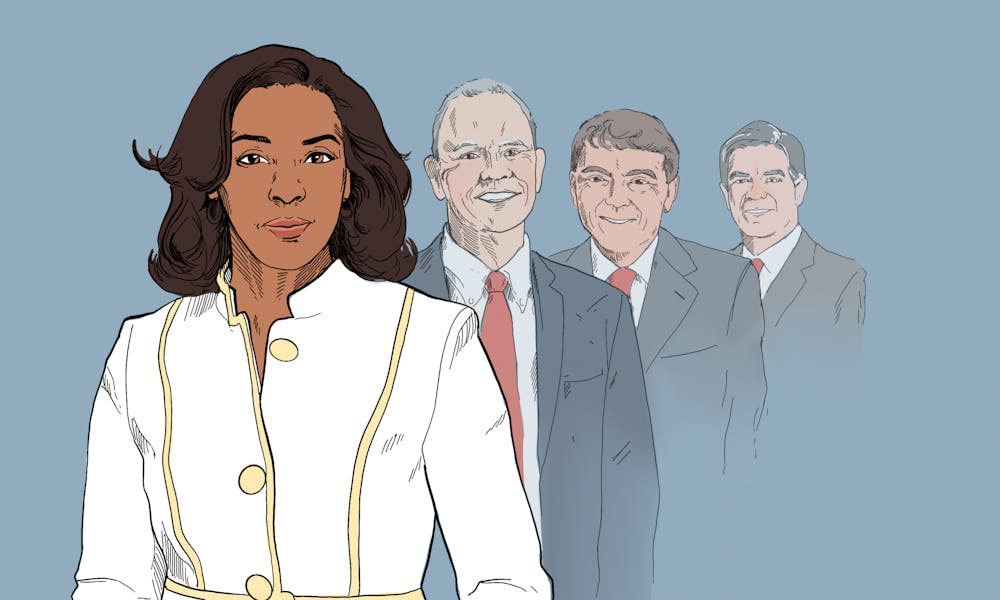It was the fairy-tale ending to an eventful Black History Month. The news broke soon after Chimamanda Ngozi Adichie was announced as this year’s commencement speaker. On Feb. 26, I opened my inbox and saw the name "Erika James." She would be Wharton’s new dean. Okay. Business as usual. However, my instinct told me to do a quick Google search. And there she was. She’s Black, and a woman, just like me.
James is the first woman to be appointed dean of The Wharton School, and the first Black dean in the school’s 139-year history. She is a trailblazer with historical precedence of being the first, as she was the first Black woman to head Emory University’s Goizueta Business School.
Her incoming presence illustrates a powerful future for students of color, specifically those who identify as women. On a campus where racist professors like Amy Wax are allowed to openly disparage Black students, the appointment of James is an extremely bold and necessary move. She represents the ability for Wharton, and other predominantly white institutions, to shift their past precedents and build a more inclusive foundation.
On our campus, we’ve recently witnessed an ideological shift, from anti-immigration guest speakers to students being harassed for their cultural identity. Wharton and Penn, like many predominantly white institutions, have evolved to accompany the diverse group of students they pride themselves in today. Joseph Wharton founded the school in the 1800s with the intent to educate white men in Economics and empower them to become leaders in their communities. His sentiments are remnants of a time when women and men of color weren’t viewed as equally deserving of the education their white male counterparts received.
As a Black woman, scholar, and leader, James occupies a unique societal niche that makes her hiring even more revolutionary. Her intersectionality strongly influences her worldview and is the backbone of her leadership. Being a person of color, especially a woman of color, in a position of power and influence is no easy feat. Glass ceilings shatter when those with marginalized identities gain access to elite spaces and prestigious positions.
James made a profound statement regarding the historical strides she’s made in her career. She hopes that ‘’we start to normalize this experience,’’ and that people will become accustomed to Black women serving as leaders. Her statement encompasses the overarching experience of minority students and faculty in the Ivy League. Many of us have become so accustomed to being the only or the exception, that we often forget that it isn’t supposed to be this way. With celebrating her achievements comes the sobering realization that the ground just isn’t level.
There is still room for greater change involving the representation of Black scholars in higher education. Commonly overlooked obstacles like implicit bias continue to prevent Black scholars and other minorities from obtaining the educational roles for which they are qualified. Black women are notoriously underrepresented as university presidents. Very few Black students earn Ph.D.s. These effects even exist outside of the United States, where it was reported that British universities employ virtually no Black scholars in positions of leadership. Penn’s undergraduate population is 7% Black, while Black faculty only account for 3% of the entire faculty population.
The case for an increase in minority faculty is increasingly relevant. At the forefront of this issue is the opportunity for all students to see themselves represented in their school faculty. According to NPR, all students benefit from — and even prefer — instructors of color. McKinsey released a study proving that organizations with a more diverse workforce are ultimately more successful than their competitors. Colleges everywhere are responding to the increasing demand for diversity and inclusion efforts by hiring chief diversity officers to oversee programming promoting equity and reduced discrimination amongst the student body.
SEE MORE FROM SURAYYA WALTERS:
In light of Black history month, Penn must do more for its Black students
Although James's hiring is a step forward for diversity and inclusion, Wharton needs to remain committed to facilitating an environment where people of diverse backgrounds and interests can thrive. Professors must become knowledgeable about the racialized power dynamics in classrooms and facilitate an equitable atmosphere.
Students shouldn’t have complaints about not seeing enough women or minority professors. As future leaders across various industries, our education needs to include the factors surrounding corporate America’s diversity problem and how we can implement solutions.
As a young Black woman who is a Wharton student, times like this make me feel a little prouder and more at peace with myself in this environment. Coming to Wharton, I was thrust into a world very different from the one in which I grew up. The racial demographics were different, and the level of wealth and elitism was something I hadn’t been exposed to, despite coming from a middle-class background.
Announcements like this give me hope that one day, people like myself won’t have to deal with feeling like an outsider. Everyone deserves to see individuals in positions of power who reflect their own identity and experience.

SURAYYA WALTERS is a Wharton sophomore from New Rochelle, N.Y. concentrating in Marketing and minoring in Urban Education. Her email address is surayyaw@wharton.upenn.edu.
SEE MORE FROM SURAYYA WALTERS:
In light of Black history month, Penn must do more for its Black students









